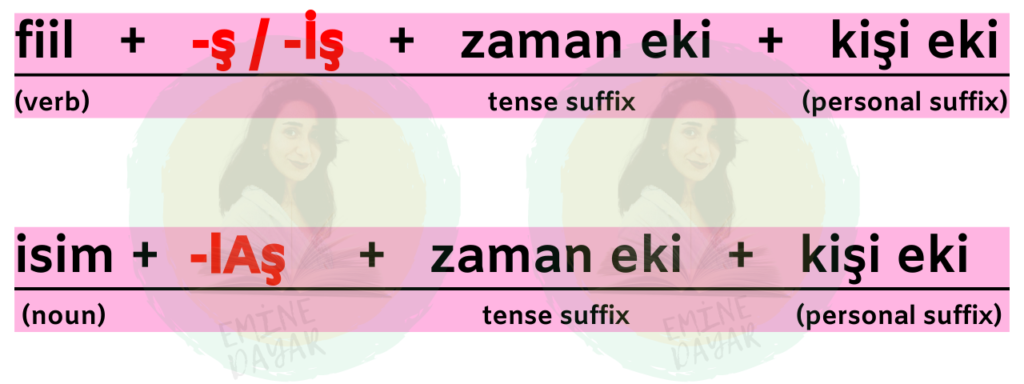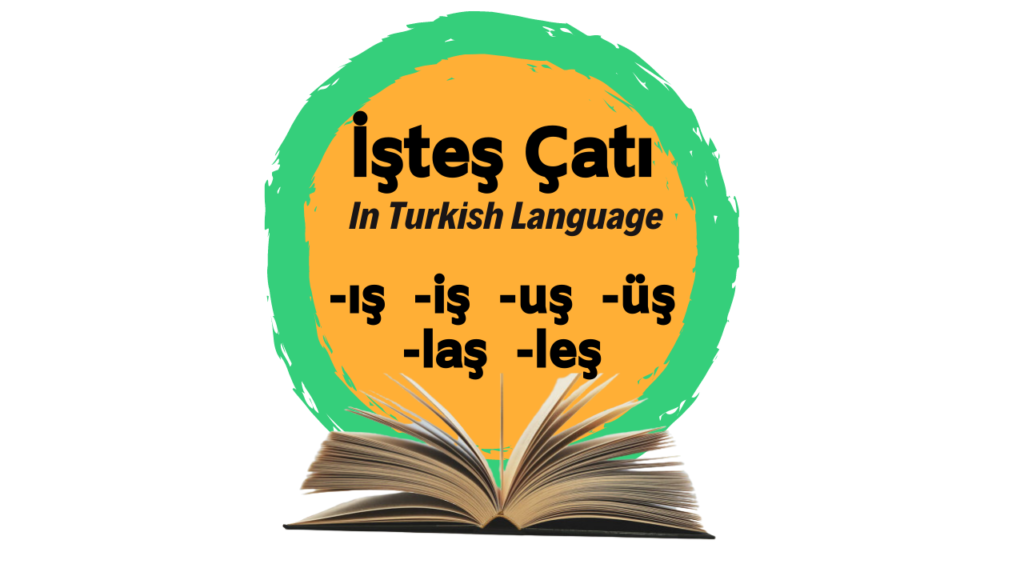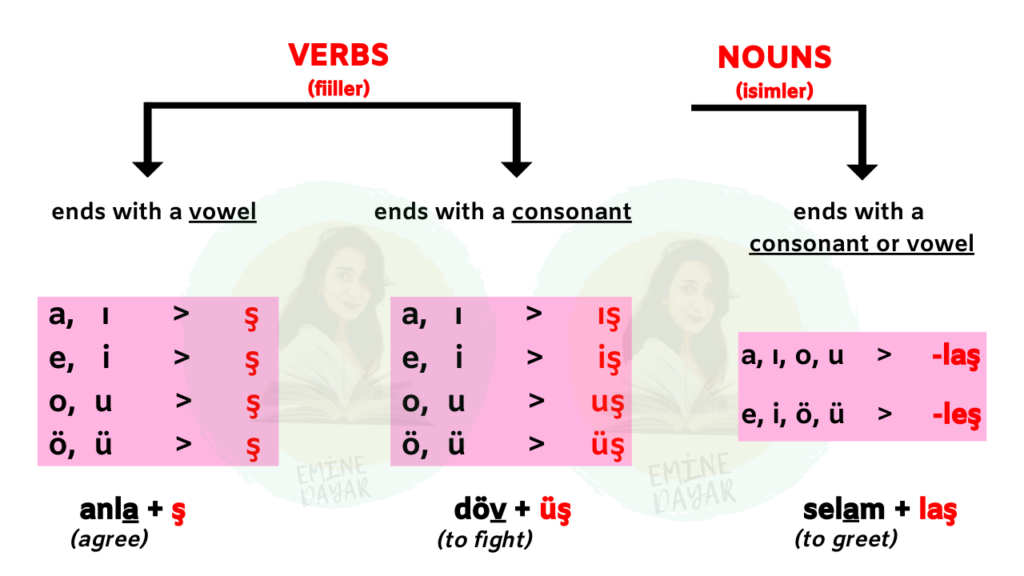What Is The “İşteş Fiil / İşteş Çatı”. What Does “İşteş Fiil / İşteş Çatı” Do?
Although the suffixes named işteş çatı / işteş fiil you will learn today cannot be used with every verb, it is a common construction in many Turkish verbs and in daily usage. You can use them to mean “together and mutual” without using the words “together and mutual”. I should say in advance that the rules may seem overwhelming at first, but don’t let this scare you. First, after reading with understanding, write short notes and some sample verbs and sentences by summarizing. Then practice by trying to use the verbs you know with these suffixes. Check back immediately to see if the examples you found in your head are correct. You will realize that you learn and accelerate over time 🙂
So, what is the “işteş fiil / işteş çatı” in Turkish? The verbs take “-ş -ış -iş -uş -üş -laş -leş“suffixes are named as işteş fiil or işteş çatı. The suffixes “-ş -ış -iş -uş -üş -laş -leş” in Turkish are used to indicate that the verb is done reciprocally (mutually) or together. That is, there is more than one subject in the sentence. There must be at least the person (or anything) doing the verb. Otherwise, a person cannot do a job mutually or together. We understand the following from these verbs: There are at least 2 people who do the verb together or mutually. Let’s take a quick look at an example. You will understand.
1. Ahmet ve ben anlaşamadık ve boşandık. (Ahmet and I did not get along and divorced.)
- Anla: to understand
- Anlaş: to understand each other, to get along, to agree (This verb is mutual.)
2. İnsanlar şaşkın ve korkmuş şekilde koşuşuyordu. (People were running, confused and scared.)
- Koş: to run
- Koşuş: to run together (This verb is done together.)
In order for a verb to be “işteş”, the work specified in the verb must be done by more than one person and the verb must have the meaning of being done together / mutually. However, some verbs seem to have the “-ş” conjugation suffix and are conjugated according to the plural person. This can be quite deceiving. However, if it is seen that the work done is not together or mutual, these actions should not be considered as “işteş”. Notice that the down below verbs are not “işteş fiil / işteş çatı”. Because they are not a joint or mutual business.
- Gelişmek (to develop)
- Ulaşmak (to reach)
- Yanaşmak (to approach)
- Alışmak (to get used to)
Sample Sentences With “İşteş Fiil / İşteş Çatı”
İlkokul arkadaşımla çarşıda buluştuk. (karşılıklı)
- (I met my primary school friend in the bazaar.) (mutual)
Park görevlisini gören çocuklar sağa sola kaçıştı. (birlikte)
- (The children, who saw the park guard, fled left and right.) (together)
Yırtıcı kuşlar köyümüzün üzerinde uçuşuyordu. (birlikte)
- (Birds of prey were flying over our village.) (together)
Çocuklar heyecanla denize koşuştular. (birlikte)
- (The children ran excitedly to the sea.) (together)
Hepimiz küçücük bir odaya doluştuk. (birlikte)
- (We all packed into a tiny room.) (together)
Yolcular havalimanında bekleşiyordu. (birlikte)
- (Passengers were waiting at the airport.) (together)
Onunla en son geçen ay görüştüm. (karşılıklı)
- (I last spoke to him last month.) (mutual)
Yurtdışındaki arkadaşımla birkaç yıl mektuplaştık. (karşılıklı)
- (I corresponded with my friend abroad for several years.) (mutual)
Yıllar sonra gördüğüm arkadaşımla hasretle kucaklaştık. (karşılıklı)
- (We embraced longingly with my friend whom I saw years later.) (mutual)
When -ş / -ış / -iş / -uş / -üş, When -laş / -leş Used?
One of the suffixes “-ş -iş -iş -uş -üş” is used in verb sentences. In noun sentences, one of the suffixes “-laş -leş” is used.

Rules:
- If the last vowel of the noun is “a, ı, o or u” , the suffix will be “-laş“
- If the last vowel of the noun is “e, i, ö or ü” , the suffix will be “-leş“
- If the last letter of the verb is a vowel , the suffix will be “-ş“
- If the last letter of the verb is a consonant and last vowel is “a or ı” the suffix will be “-ış“
- If the last letter of the verb is a consonant and last vowel is “o or u” the suffix will be “-uş“
- If the last letter of the verb is a consonant and last vowel is “e or i” the suffix will be “-iş“
- If the last letter of the verb is a consonant and last vowel is “ö or ü” the suffix will be “-üş“
If you have any question about “işteş fiil / işteş çatı / -ş -ış -iş -uş -üş -laş -leş suffixes in Turkish or any subject about Turkish language just let me know in the comment below. Btw we also share all Turkish grammar lessons, some daily usefull tips, Turkish idioms and more about Turkish language and Turkish culture on YouTube channel! You can watch all lessons for free now! Just click here and subscribe to don’t lose our videos. See you in another lesson!

